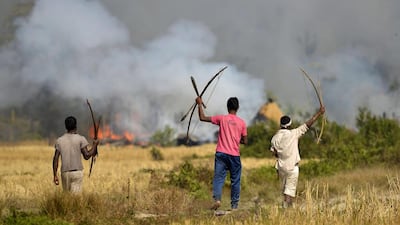GUWAHATI, INDIA // Hundreds of survivors sought shelter in a church and school on Wednesday after a brutal rebel attack in a north-eastern state that left more than 60 dead, including women and children.
The heavily armed militants launched coordinated attacks in rural Assam on Tuesday, pulling villagers from their homes and shooting them at point-blank range.
“I saw my wife and two sons being shot dead before my eyes,” said Anil Murmu, a survivor from the worst-hit village of Phulbari, where 30 people were killed.
“I somehow managed to escape by hiding under the bed,” the 40-year-old said.
Police said the rebels belonged to a faction of an indigenous separatist group and that the victims were all tribal settlers known as Adivasi. They are a mix of Hindus and Christians and many had been preparing for Christmas when the attack took place, survivors said.
In Shamukjuli village in Sonitpur district, where 26 people were killed, at least 100 people - mostly women and children - sought refuge in a church. Another 200 people ran to a nearby school.
“This is one of the most barbaric attacks in recent times, with the militants not even sparing infants,” said Tarun Gogoi, Assam’s chief minister.
Mr Gogoi said at least 65 people were killed in the rebel attacks, 12 of them children, according to police.
Assam, which borders Bhutan and Bangladesh, has a long history of violent land disputes between the indigenous Bodo people, Muslim settlers from Bangladesh and rival tribes in the area. Most of the Adivasis, whose ancestors migrated to Assam more than 100 years ago, have worked on tea plantations.
Police said the attacks were carried out by a faction of the outlawed National Democratic Front of Bodoland (NDFB). For decades, the group has waged a violent campaign for a separate homeland for the people of the Bodo tribes indigenous to India’s north-east.
Police said recent talks initiated by the national government with one faction of the NDFB may have provoked the attacks. Some hardliners within the group opposed negotiations.
Following the attacks, angry Adivasis surrounded a police station in Sonitpur and attempted to attack the officers inside, said SN Singh, a top police official. Police opened fire, killing three Adivasis, he said.
He said there were also incidents of Bodo homes being attacked, but troops managed to control the situation.
A curfew was imposed in two districts and police and paramilitary forces patrolled the area.
“We are trying to ensure that ethnic violence does not flare up,” Mr Singh said.
India’s Prime Minister Narendra Modi condemned the attacks, and the home ministry rushed several thousand federal paramilitary troops to the region, the junior home minister Kiren Rijiju said.
Bodo militants have in recent years launched ferocious attacks on both Muslim settlers and Adivasis who oppose their claim for an independent homeland. Earlier this year, about 10,000 people fled their homes when violent clashes over a border dispute left more than 45 people dead. In 2012, ethnic clashes in the same area in Assam claimed about 100 lives and displaced more than 400,000 people.
Dozens of rebel groups have been fighting the government - and sometimes each other - for years in seven states in north-east India. They demand greater regional autonomy or independent homelands for the indigenous groups they represent, and accuse the federal government of exploiting the region’s rich mineral resources while neglecting the local people.
* Agence France-Presse and Associated Press

